Need a way to show events or let people book time on your site? A WordPress calendar plugin can help. Whether you run a local business, teach classes, sell tickets, or host meetups, adding a calendar makes it easier for visitors to stay in the loop. You don’t need to know code or hire a developer.
Table of Contents
The 8 Best WordPress Calendar Plugins
We tested a bunch of WordPress calendar plugins and picked the best ones for different needs. If this is your first time using a plugin, check our guide on installing WordPress plugins and remember to back up your site before making big changes.
1. The Events Calendar
The Events Calendar is a flexible plugin built for anyone who wants to display events on their WordPress site. It’s trusted by thousands of websites, from small blogs to large universities. You can list upcoming events, manage recurring schedules, and even sell tickets with the right add-ons.
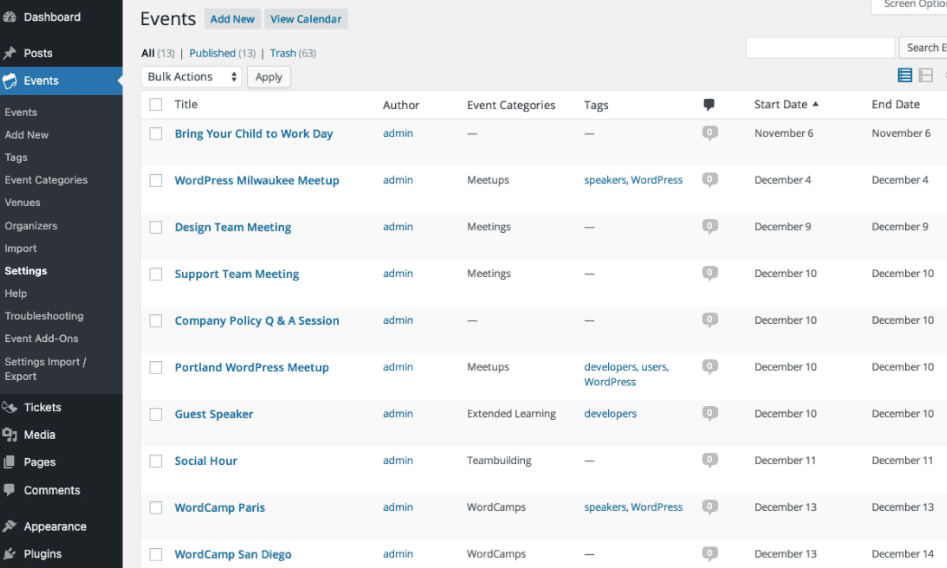
The Events Calendar creates a unique page for each calendar and event, and you can also generate QR codes for your events.
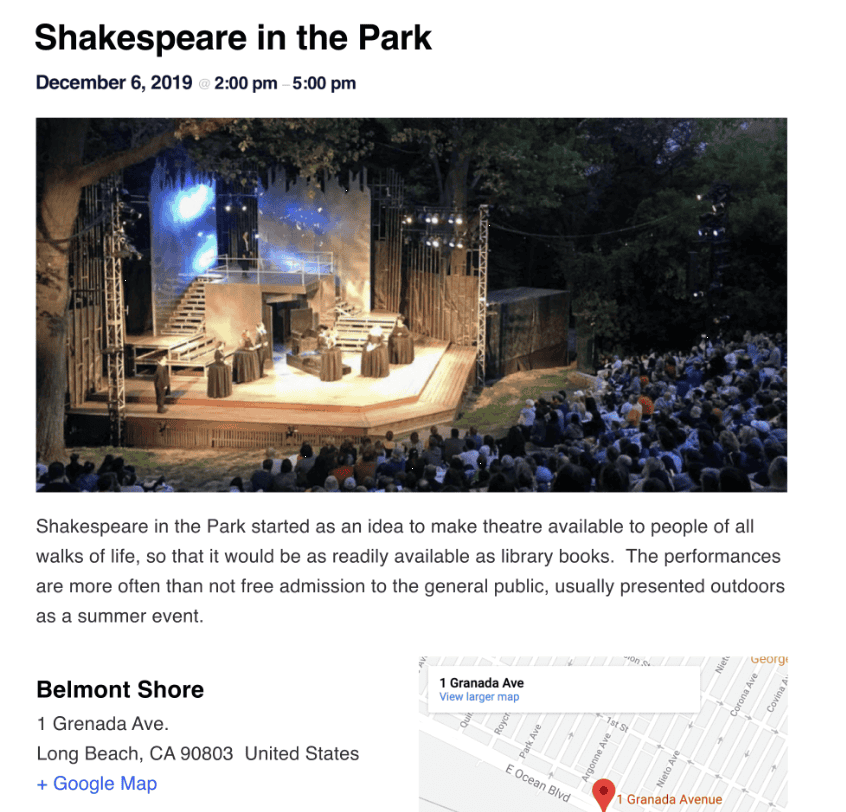
You can add them to your pages and posts with a Gutenberg block. It’s well-designed, responsive, and easy to set up for non-tech experts.
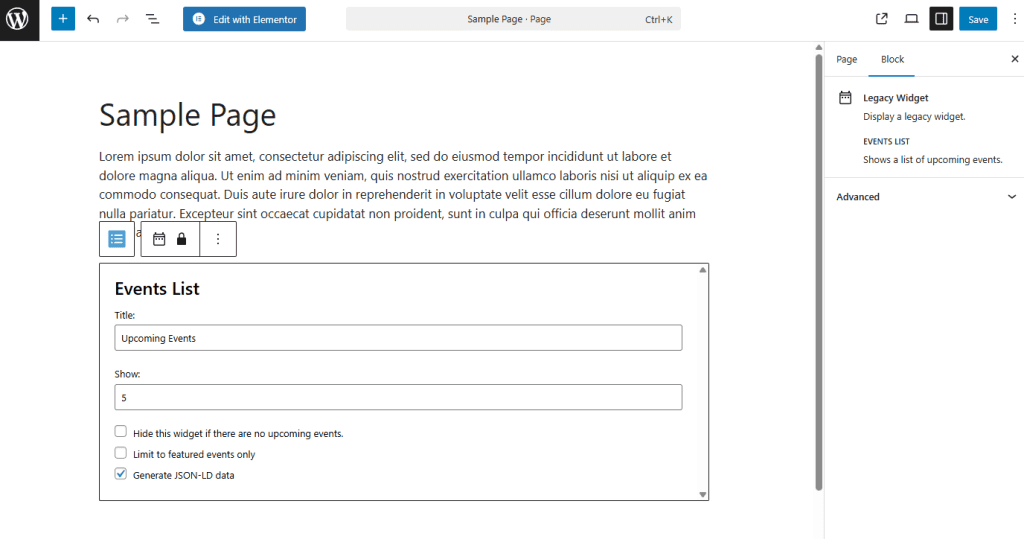
You get a clean monthly calendar by default, but you can also switch to list view or day view.
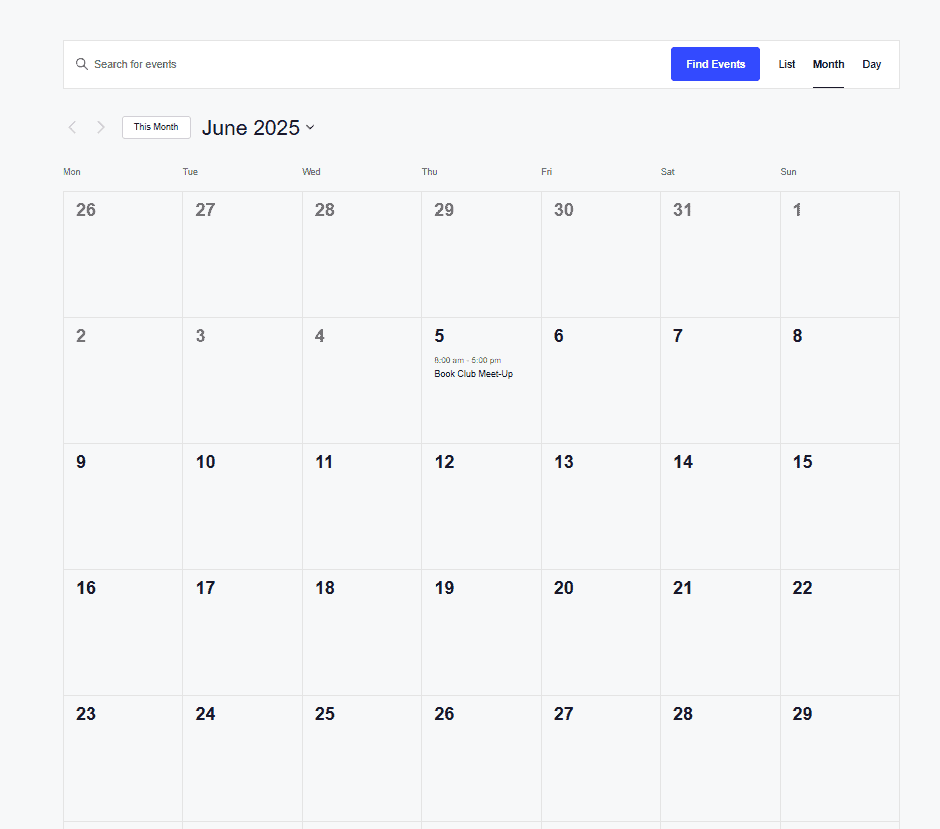
You can place the calendar anywhere on your site with their embed code.
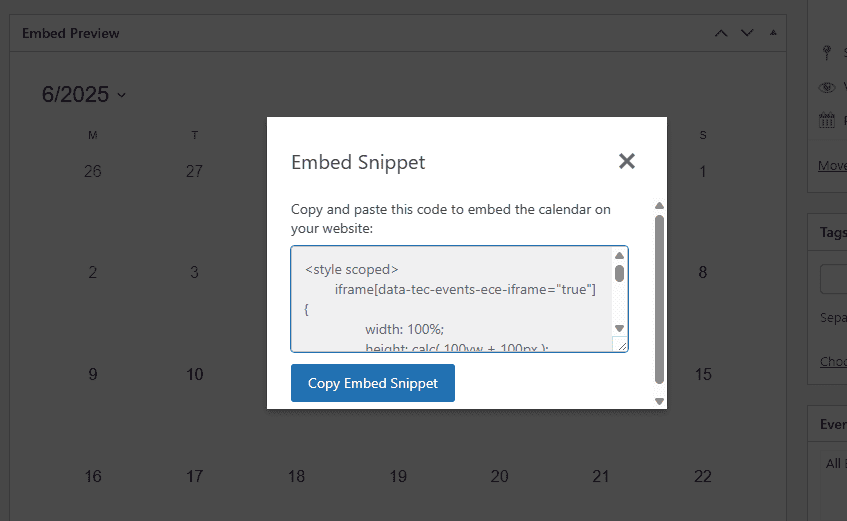
Events are easy to add. It’s just like creating a blog post. You can set dates, times, locations, and add images or maps. You can find out more by reading our complete guide to The Events Calendar WordPress plugin.
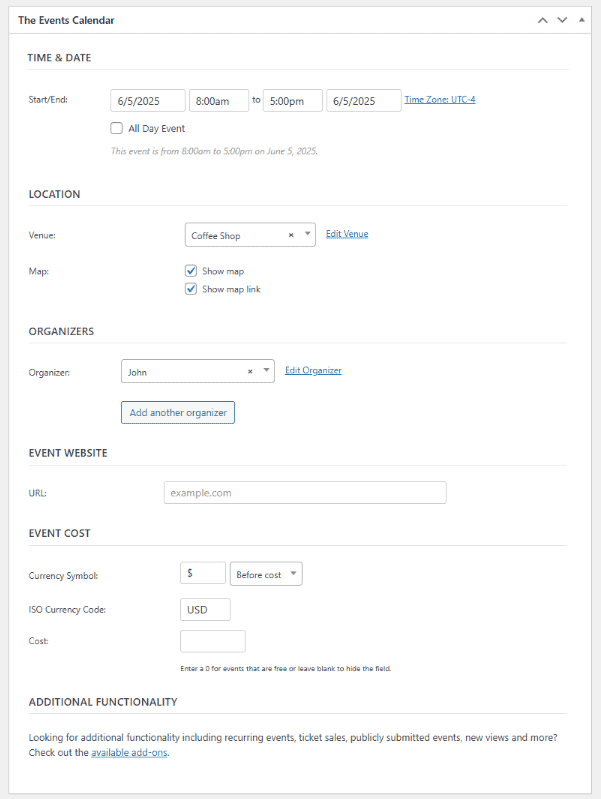
If you upgrade to the Pro version, you can add features like recurring events, extra calendar views, and advanced filtering.
Main Features
- Month, list, and day calendar views
- Easy event creation and management
- Google Maps and location support
- Recurring events (Pro)
- Event search and filters
- iCal and Google Calendar export
- Block editor and shortcode support
- Paid add-ons for RSVPs, tickets, and more
What we like: The Events Calendar looks great right away. You don’t need to mess with code to make it work. Adding events is fast. The layout adjusts well on mobile. If you need more, the Pro add-ons let you build a full event system without switching plugins. There’s also a large support community and detailed help guides.
What could be better: The free version is a bit limited. You only get basic views and features. To unlock recurring events or better filters, you need to pay. Also, the plugin can be a little heavy if your site already has lots of features.
Pricing: The core plugin is free. The Pro version starts at $149 per year. Paid add-ons like Event Tickets or Event Aggregator cost extra.
2. Timely All-in-One Events Calendar
Timely All-in-One Events Calendar is a sleek, cloud-based plugin made for event management.
This plugin connects with Timely’s online platform, which gives you more control and extra features outside of WordPress. You still manage events in your WordPress dashboard, but everything syncs with your Timely account in the cloud.
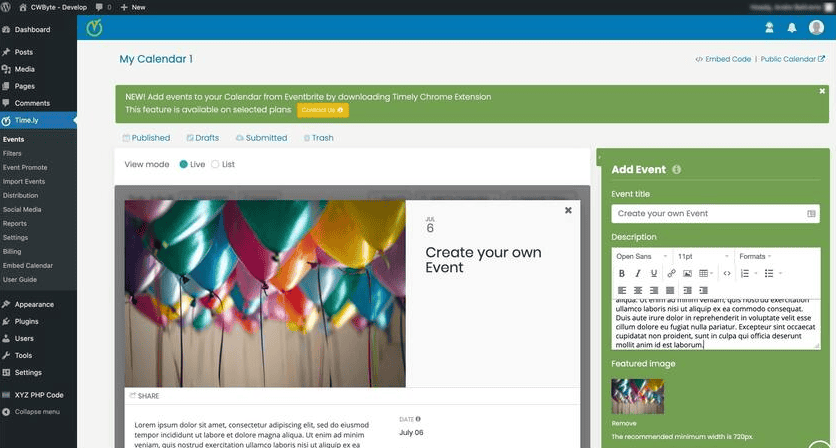
You get a clean, modern calendar right out of the box. You can choose different views like month, week, or agenda. It also supports color coding and categories, so your visitors can filter events based on what they’re looking for.
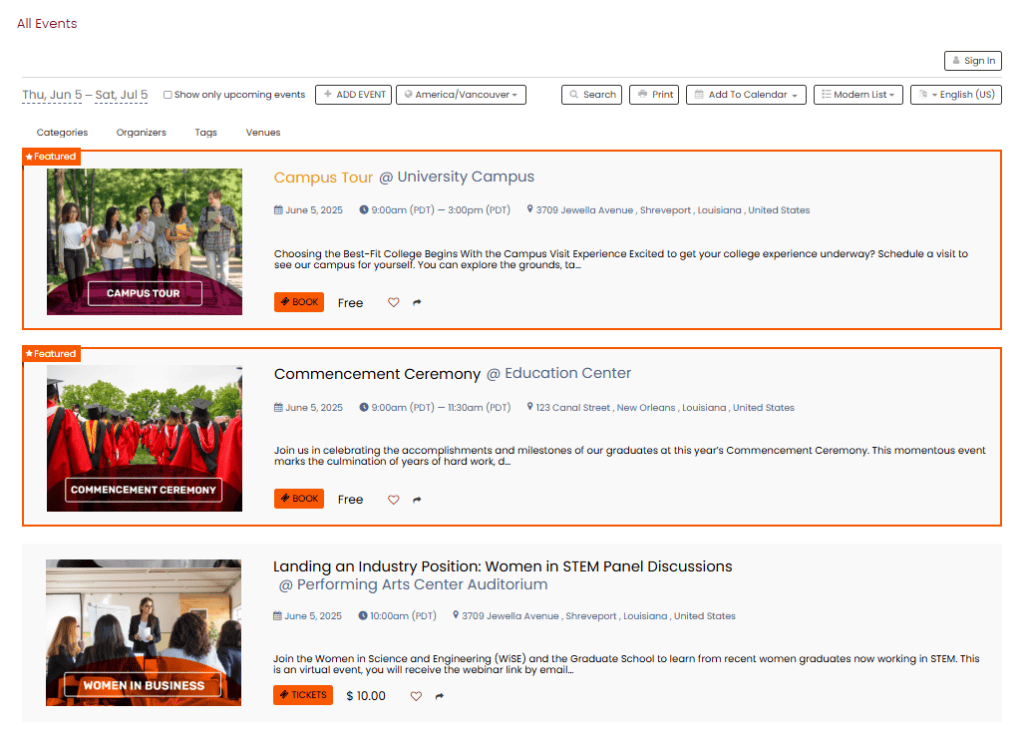
The calendar is responsive and fits well on mobile. You can embed it anywhere on your site with a shortcode.
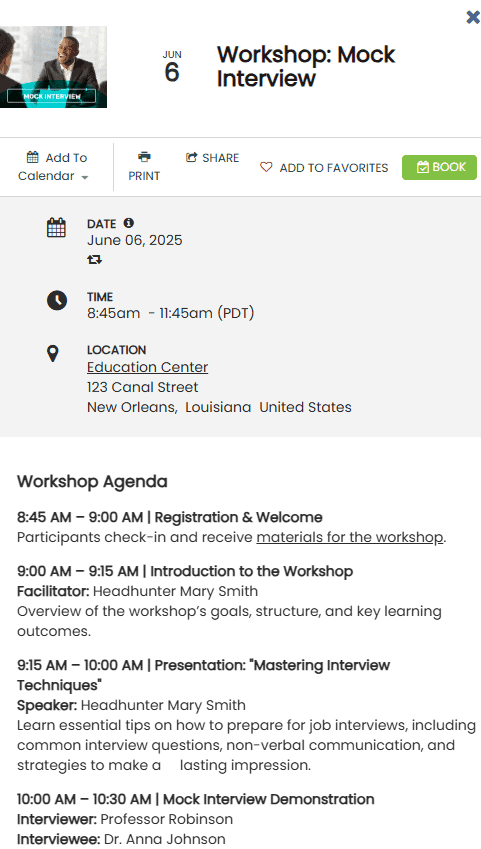
The plugin also supports importing events from Google Calendar, Outlook, and other feeds.
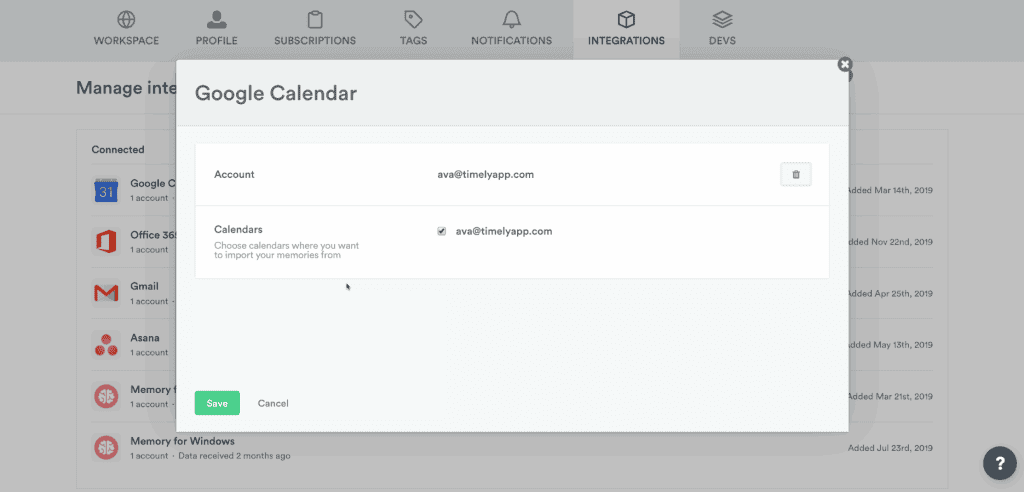
If you upgrade to a paid plan, you can unlock features like ticketing, event registration, recurring events, and more control over calendar styling.
Main Features
- Month, week, and agenda views
- Cloud-based event management
- Event filtering and color coding
- Sync with Google Calendar, Outlook, and iCal
- Easy event import and export
- Responsive design for mobile and desktop
- Embeddable calendar widget
- Paid plans include ticketing, RSVPs, and recurring events
What we like: The design is clean and modern. It looks polished on any device. The sync feature is great if you already manage events in other calendars. You don’t need to install 10 different plugins to make it work.
What could be better: Because it’s tied to a cloud platform, some users may not like depending on an external service. The free version is also pretty basic. If you want advanced features like recurring events or ticketing, you’ll need a paid plan.
Pricing: The core plugin is free. Paid plans start at $9 per month and go up depending on which features you need. If you plan to sell tickets, they charge 2.5% + US$ 0.90 per registration or ticket sold.
3. My Calendar
My Calendar is a simple and flexible plugin built for people who want full control over how their calendar looks and works. No third-party services necessary.
The event editor is simple and easy to use. You can set up recurring events, add event locations, set accessibility options, and add registration/ticket settings.
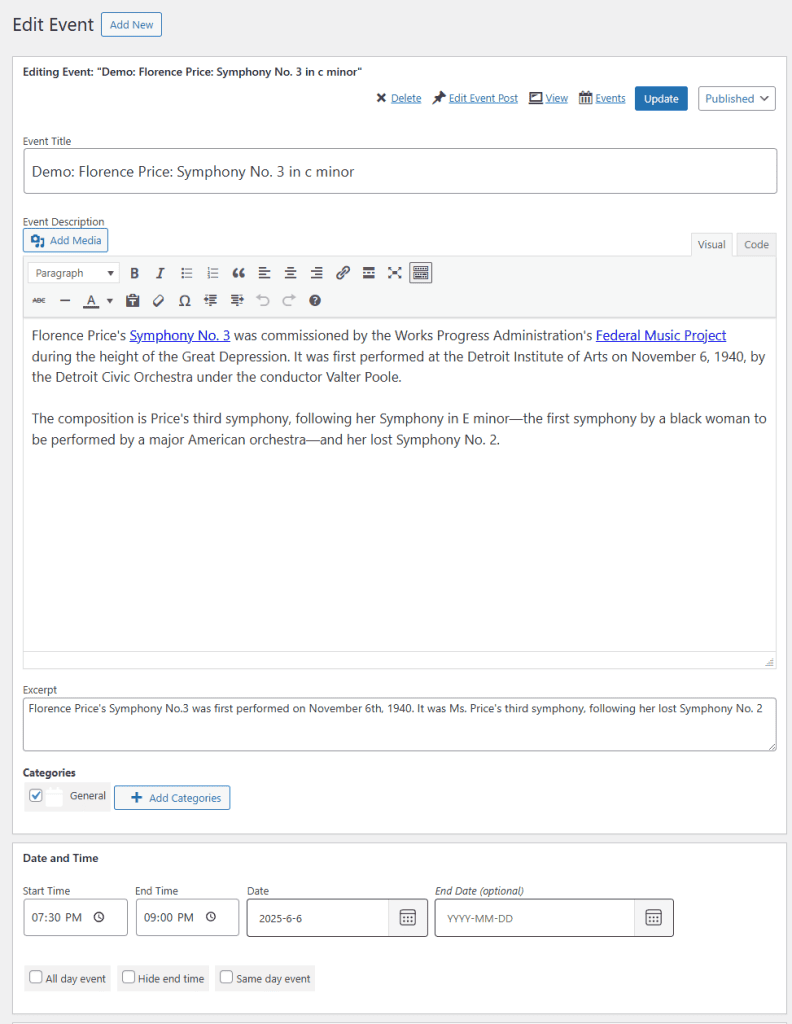
You can create multiple calendars and choose where to show them. The plugin supports monthly, weekly, and list views.
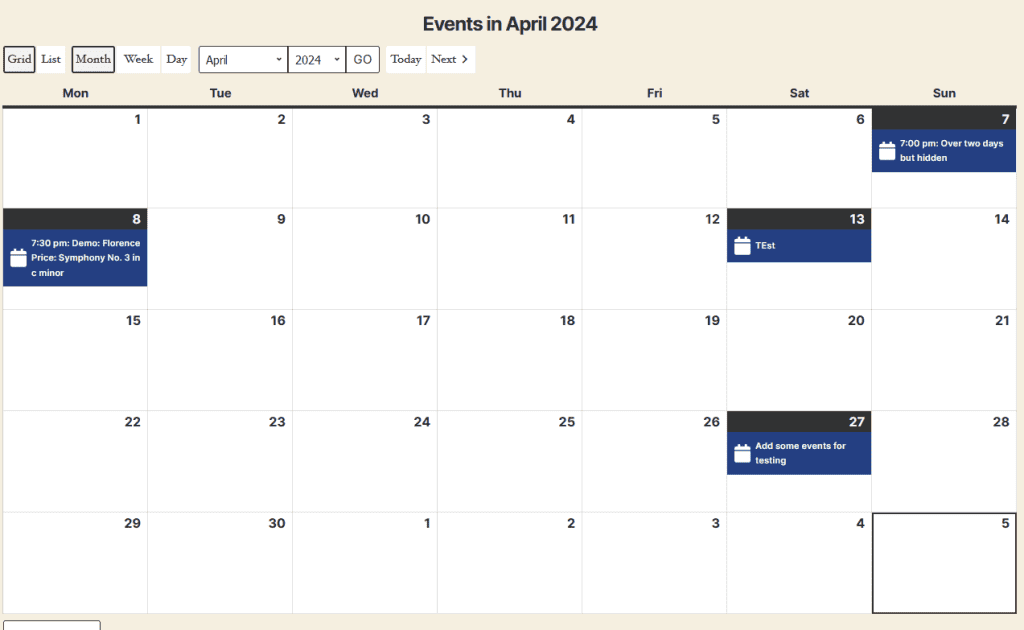
If you need to show different calendars on different parts of your site, My Calendar lets you make shortcodes and widgets.
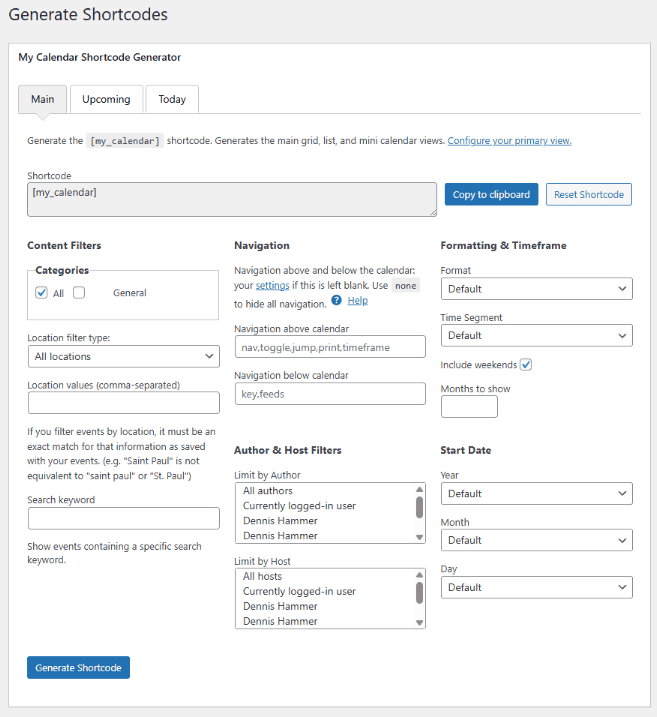
My Calendar is also one of the more customizable options. You can tweak the colors, templates, and layout without writing code. It even includes basic accessibility features to help more people use your calendar.
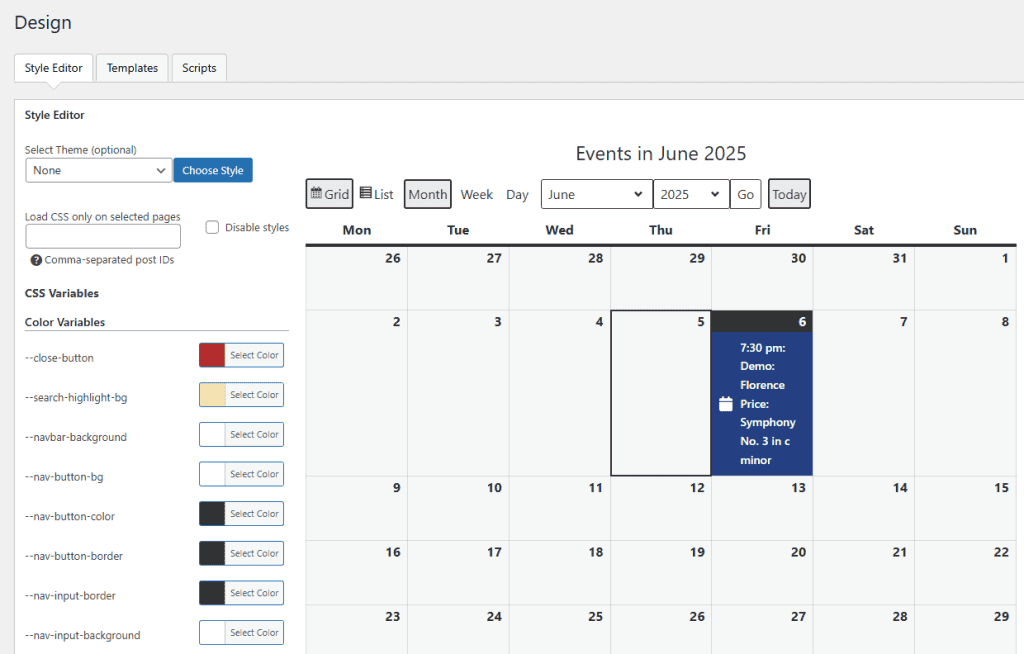
Main Features
- Month, week, and list views
- Recurring events
- Custom templates and CSS support
- Multiple calendars and categories
- Location manager
- Mini calendar widget for sidebars
- Shortcodes for easy placement
- Basic accessibility support
What we like: My Calendar is perfect if you want something that works right away but also lets you dig deeper. It’s lightweight, flexible, and gives you total control over the look of your events and calendars. It also has solid documentation and support from the developer.
What could be better: The design feels a little outdated out of the box, especially compared to some fancier plugins. You’ll likely want to spend some time customizing the look to match your site.
Pricing: The core plugin is free. My Calendar Pro starts at $59 per year and adds features like RSVPs, user submissions, and advanced event management.
4. WP Event Manager
WP Event Manager is a lightweight and fast event management plugin. It’s fairly easy for beginners to use.
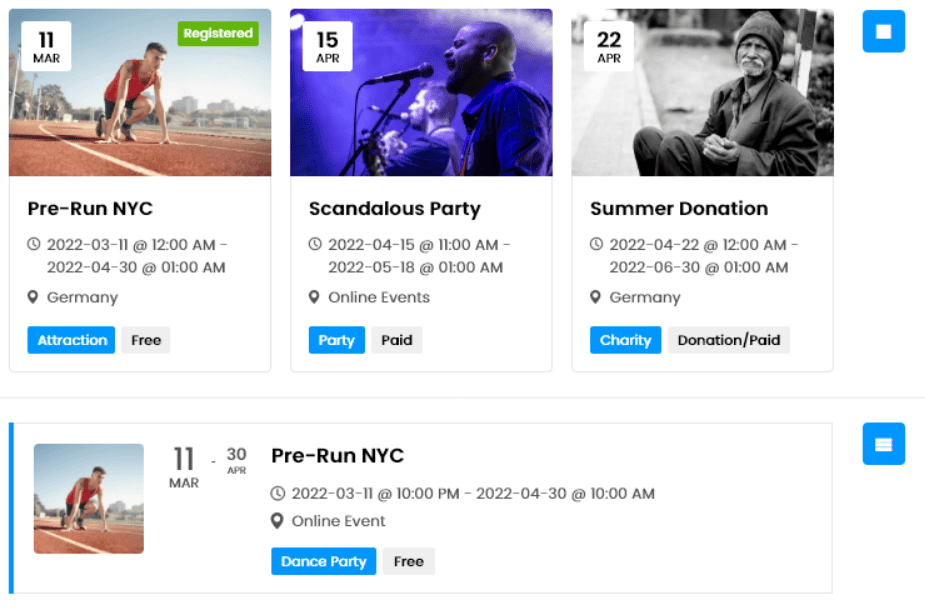
You can list events, allow users to submit their own, and display everything in a clean, modern layout.

It works with any theme and uses shortcodes and blocks to place calendars or listings anywhere on your site.
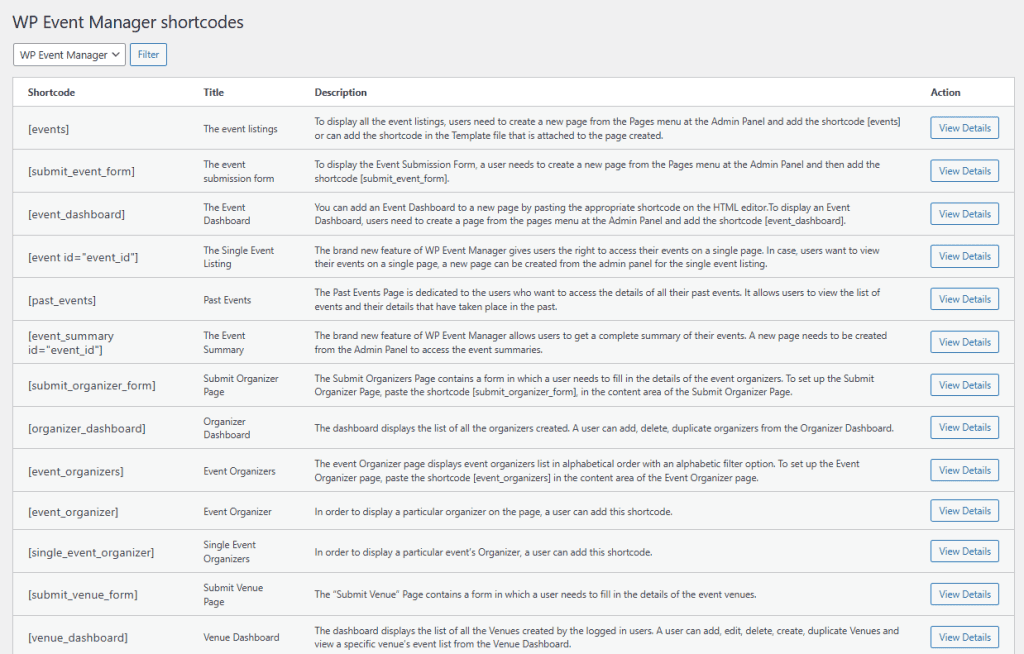
The core plugin focuses on listing events. It includes features like search filters, category sorting, and event details. If you want extra features like ticketing, Google Maps, or calendar views, you can add them through paid add-ons. This lets you build only what you need, without bloating your site.
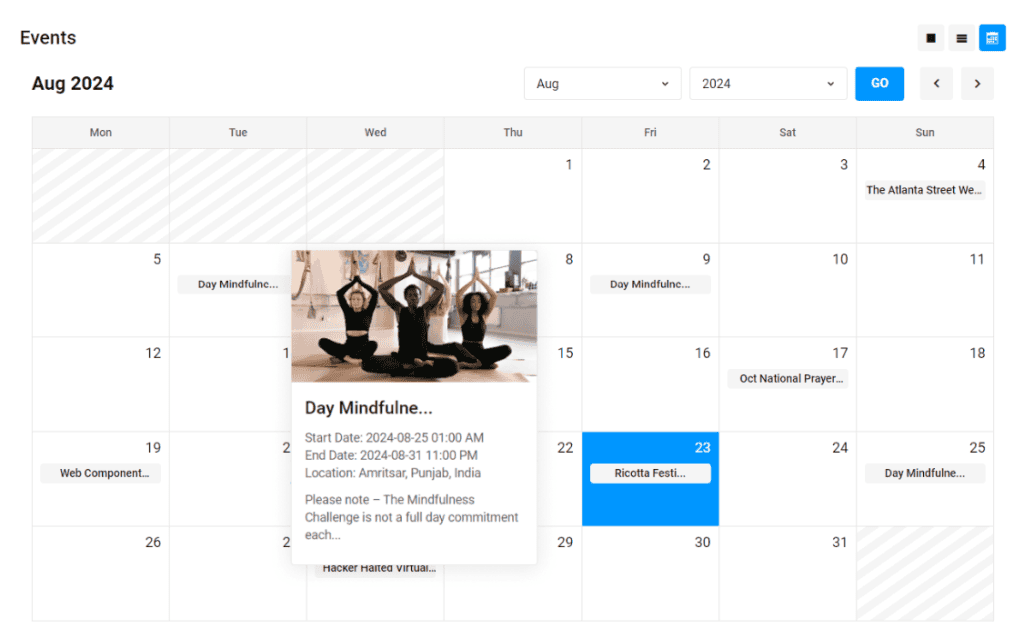
WP Event Manager is also developer-friendly, so if you ever need to extend it later, you can. But it’s simple enough for non-technical users to manage from the start.
Main Features
- Event listings with shortcodes and blocks
- Frontend event submissions
- Search filters and categories
- Lightweight and fast
- Compatible with all WordPress themes
- Add-ons for ticketing, calendar view, and more
- Multilingual support
What we like: WP Event Manager is very clean and easy to use. The layout looks professional without needing a lot of styling. You can start with the free version and only pay for what you need. The event listing system works well right out of the box, and the search filters make it easy for visitors to browse.
What could be better: The core plugin is focused only on listings, so you’ll need paid add-ons to get things like calendar views or ticketing. If you want everything in one place without mixing plugins, this setup might feel a bit scattered. Also, setup can take some time if you’re using lots of add-ons.
Pricing: The core plugin is free. Individual add-ons start at $19 each. You can also buy bundles that include several features. The full bundle starts at $99 per year.
5. Simple Calendar
Simple Calendar is one of the best WordPress calendar plugins due to its simplicity. It’s a straightforward tool that connects to your Google Calendar and displays events on your website.
It’s a great tool if you already use Google Calendar and just want to show those events on your site without adding them twice. The plugin pulls in your events automatically and keeps everything in sync.
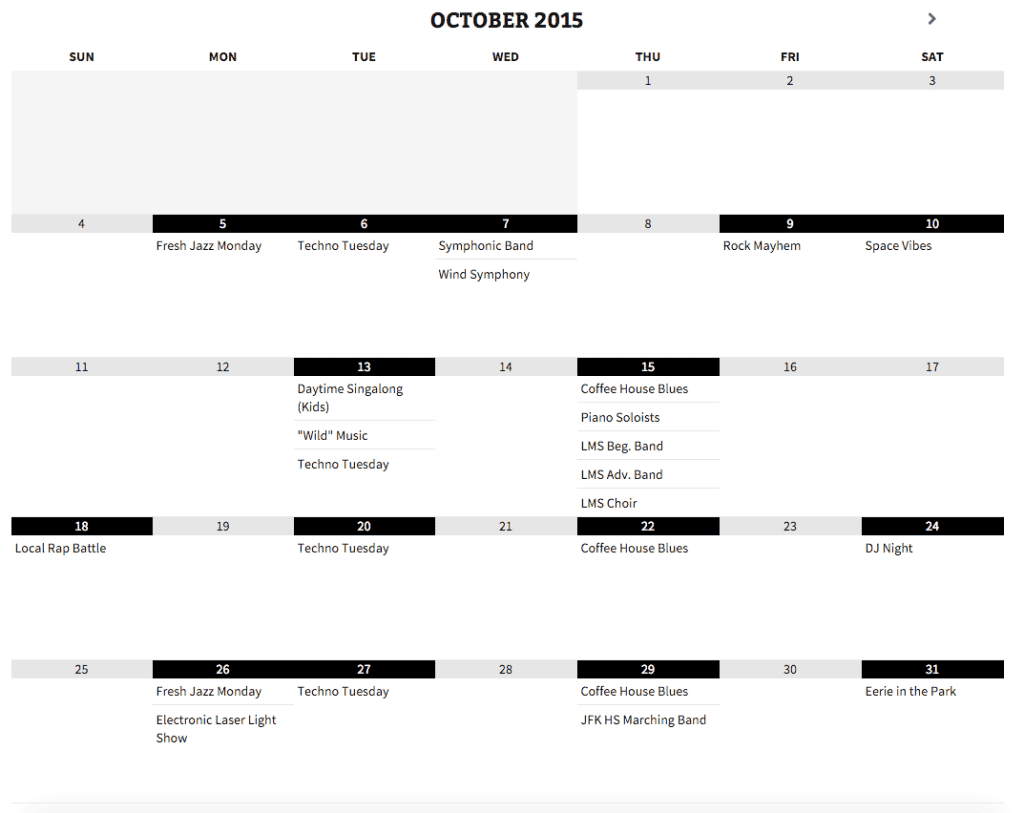
You can make basic customizations to the look of your calendar. You can also choose between monthly view or list view.
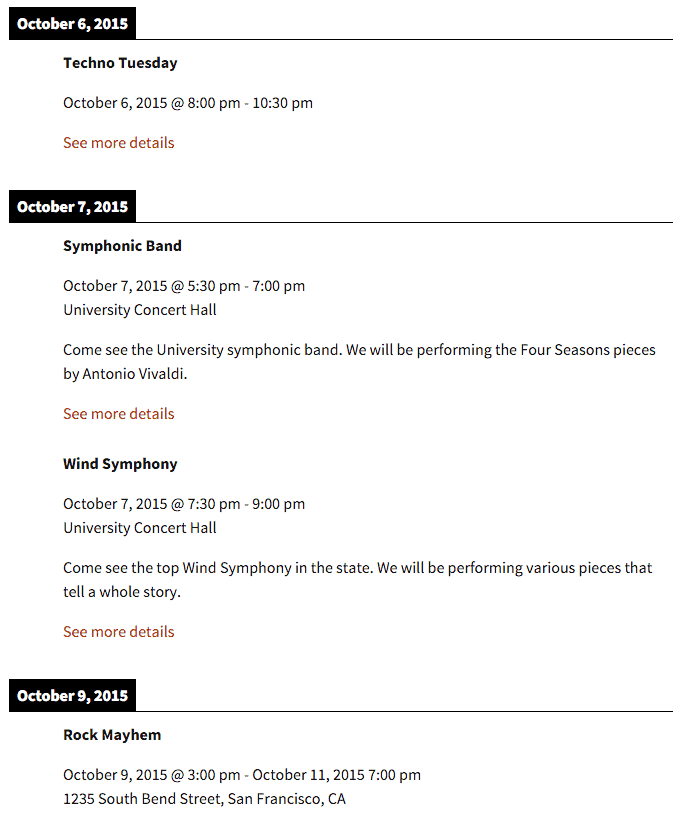
It works with shortcodes, so you can place it on any page or post. This means it supports multiple calendars and lets you show different ones in different places.
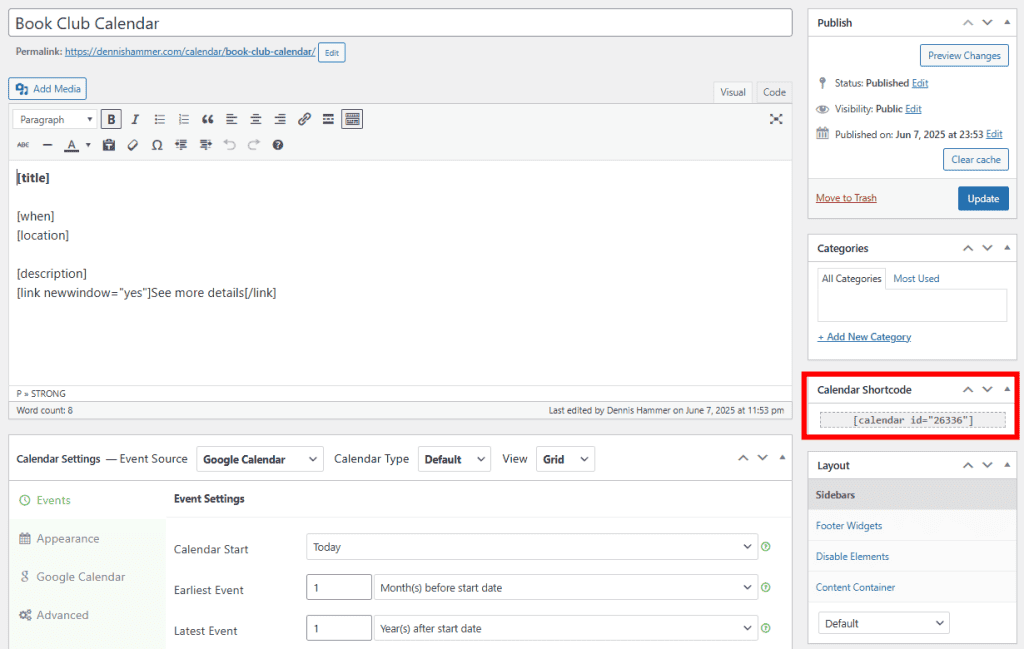
If you upgrade, you get extra features like recurring event support, advanced layouts, and better control over how events appear.
Main Features
- Syncs with your Google Calendar
- Automatic event updates
- Monthly and list views
- Works with shortcodes
- Custom color and layout options
- Supports multiple calendars
- Pro add-ons for recurring events, attachments, and more
What we like: It’s easy to use and works quietly in the background. If you already live in Google Calendar (and integrate with other Google products), this plugin saves time. The design is clean and fits well with most WordPress themes.
What could be better: The free version is basic. You’ll need to upgrade for features like recurring events or attachments. Also, since everything is managed in Google Calendar, you can’t edit events from your WordPress dashboard. That might be a downside if you want everything in one place.
Pricing: The basic plugin is free. The premium version starts at $99 per year for extra features like private events, booking appointments, and extra options.
6. Booking Calendar
Booking Calendar is a user-friendly plugin made for scheduling and bookings. It’s ideal for people who offer services by appointment — like coaches, salons, rental owners, or freelancers.
Unlike other WordPress calendar plugins that just list events, this plugin lets your visitors book time slots directly from your site. You get a calendar view, a booking form, and email notifications, all built into one tool.
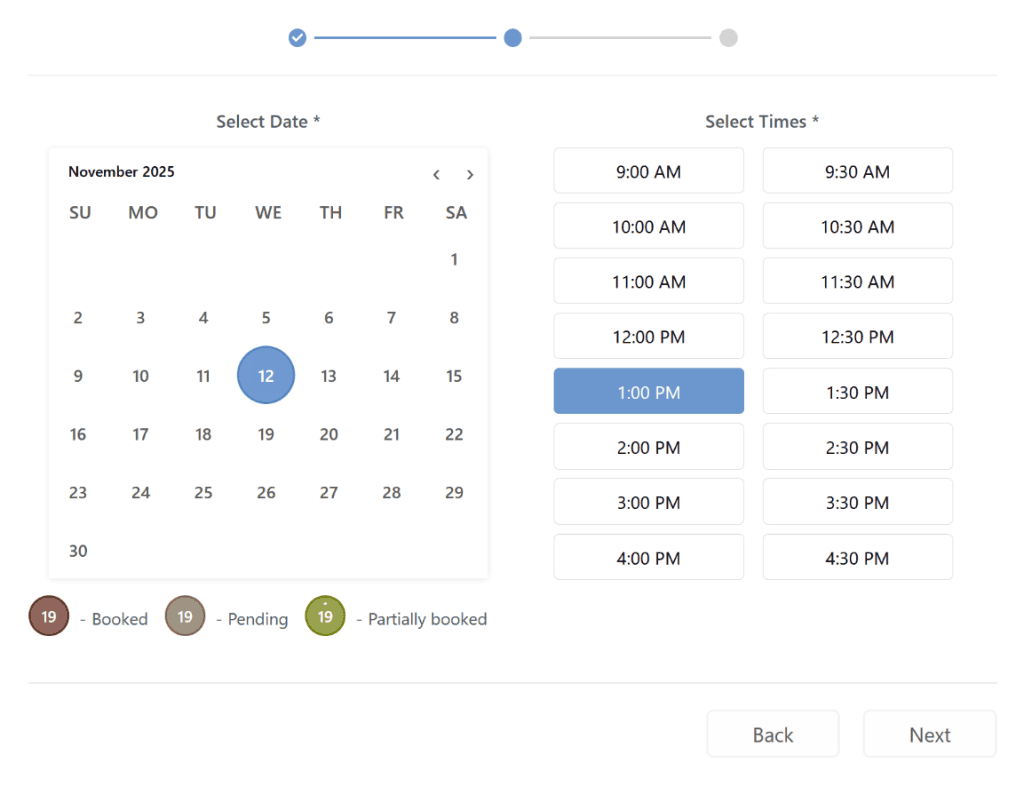
The calendar shows which dates are available and which are already booked. You can set limits on how many people can book per day or time slot. You can also block out dates manually.
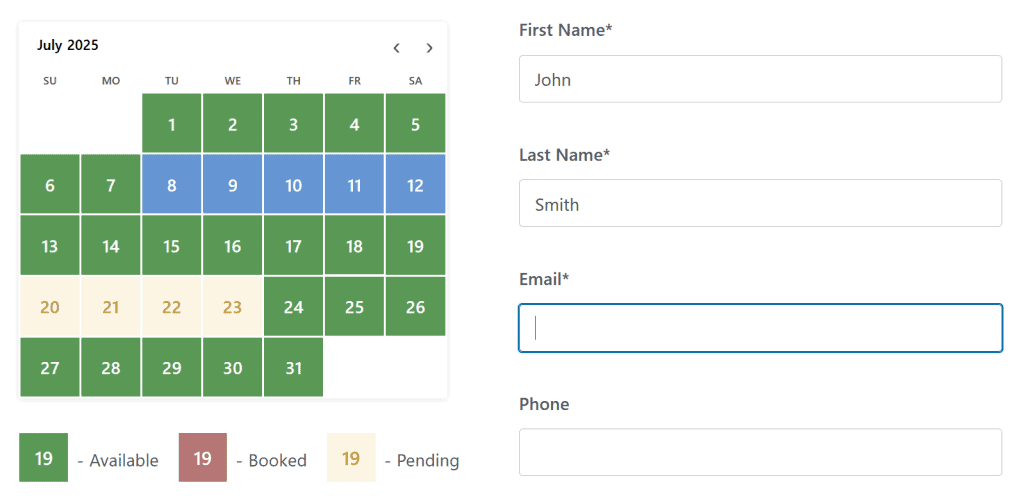
All of your appointments are managed from your WordPress backend. If you have a lot of appointments, you can filter by date and status, or use the search feature.
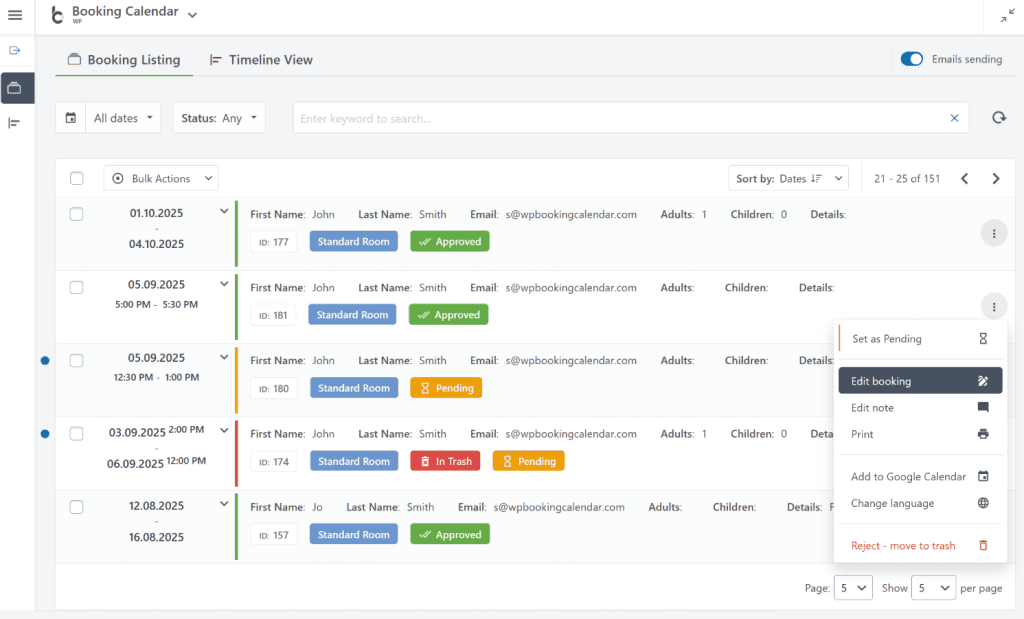
If you need more control, the Pro version adds features like multiple calendars, syncing with Google Calendar, and online payments.
Booking Calendar works with a shortcode, so you can place your calendar and booking form anywhere — on a page, in a post, or even in a widget.
Main Features
- Accepts bookings through your website
- Shows available and booked dates
- Calendar and form are fully customizable
- Email notifications for you and your visitors
- Admin panel to manage bookings
- Shortcode support
- Pro version adds Google Calendar sync and online payments
What we like: It’s simple, clean, and does exactly what it promises. You don’t need any outside tools to get started. Visitors can book in just a few clicks, and you can manage everything from your WordPress dashboard. The calendar blends in nicely with most sites, and the free version is very usable.
What could be better: The free version only supports one calendar and one service, so it’s limited if you run a larger operation. You’ll need the Pro version for features like multiple calendars, time slot control, or payment integration. The interface also feels a little dated, though it works fine once you get the hang of it.
Pricing: The basic version is free. Pro plans start at $42 per year and go up based on features like multi-user support, payment tools, and advanced scheduling.
7. Sugar Calendar
Sugar Calendar is a lightweight event calendar plugin for WordPress that focuses on simplicity and speed. It’s built by Sandhills Development, the same team behind Easy Digital Downloads, so it’s well-supported and regularly updated.
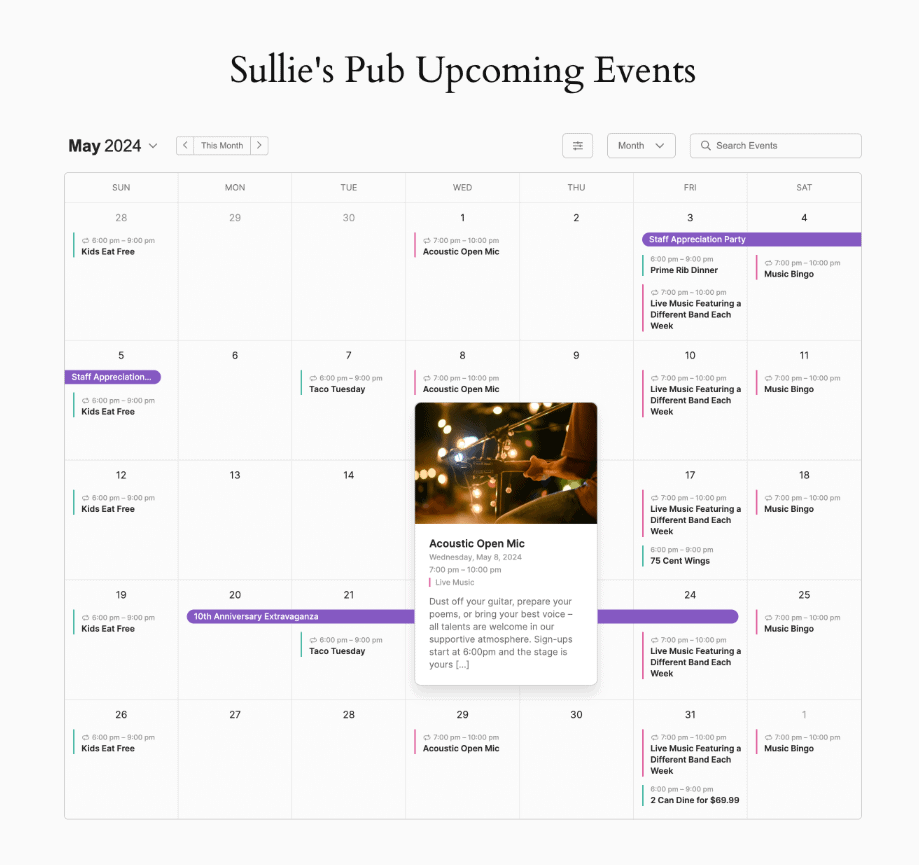
Unlike some plugins that come packed with features you may never use, Sugar Calendar sticks to the basics. We’re a big fan of the calendar-style dashboard in WordPress.
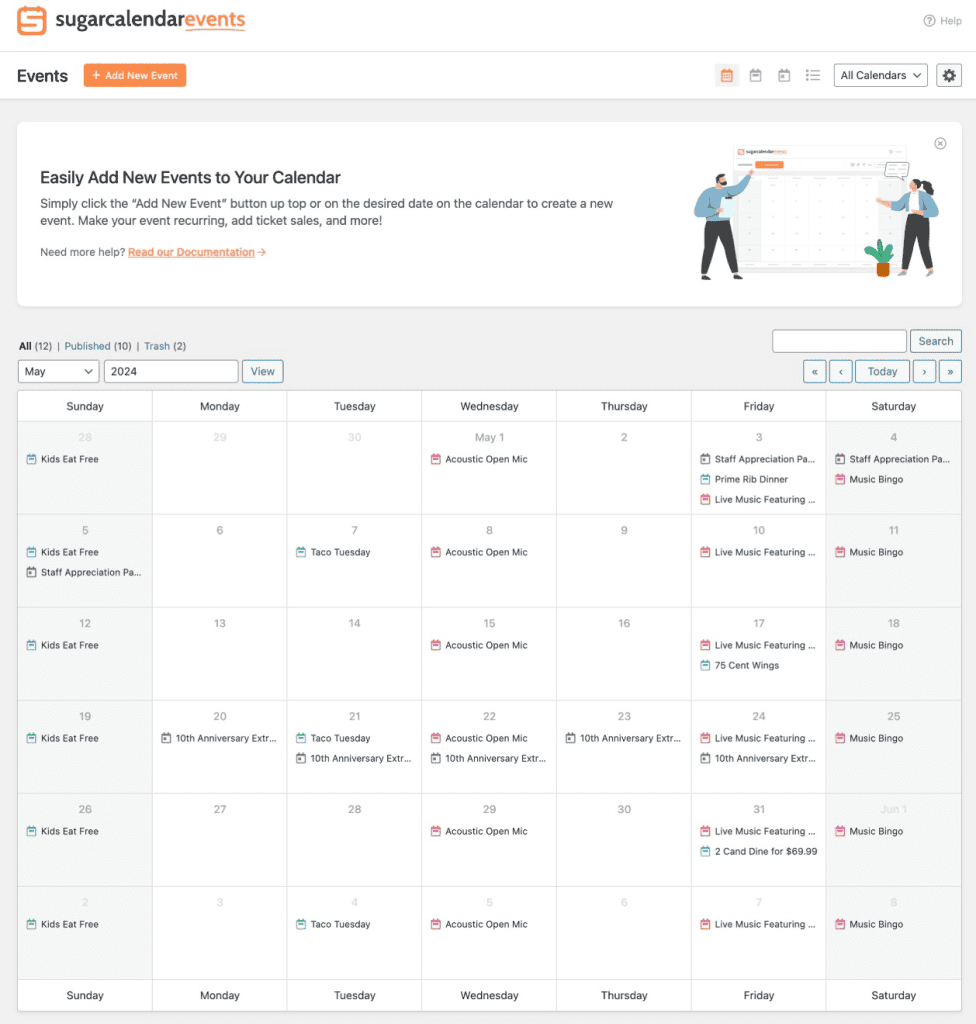
Each event has a title, description, date, time, and optional location. You can display events using a calendar view or list view.
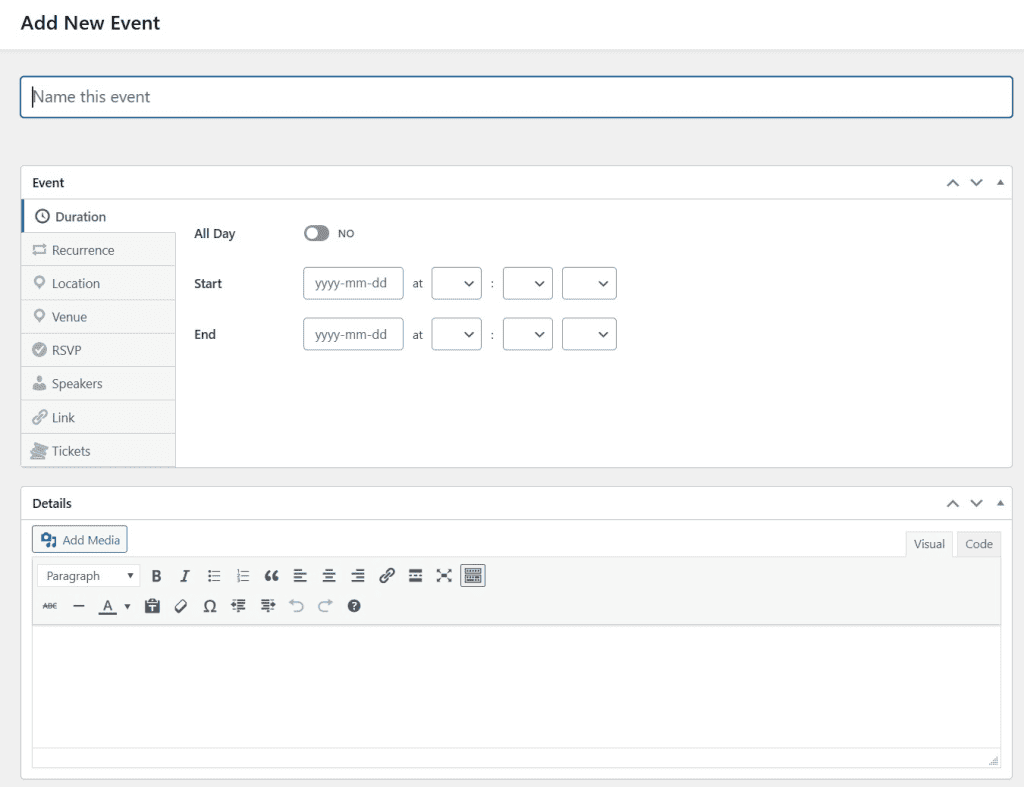
The plugin also supports recurring events, time zones, and front-end event submission with the right add-ons. It works with most themes and doesn’t slow down your site.
If you want extras like ticketing or integrations with tools like Google Calendar and Zapier, you can add those through paid extensions.
Main Features
- Simple event creation
- Clean calendar and list views
- Recurring events
- Time zone support
- Front-end event submission (Pro)
- Google Calendar and iCal export
- Lightweight and fast
- Add-ons for payments, integrations, and more
What we like: Sugar Calendar is fast, clean, and easy to use. It doesn’t try to do everything — just the basics really well. If you want a calendar that’s easy to manage and won’t slow down your site, this one is a solid pick. The design is minimal and works great with most themes.
What could be better: The free version is very limited. You only get basic event listings. To get features like recurring events, front-end submissions, or calendar syncing, you need to upgrade. It’s also not as flexible out of the box as some other plugins, so advanced users may find it lacking without the right add-ons.
Pricing: The free version is available on WordPress.org. Paid plans start at $49 per year. Add-ons like ticketing, Google Calendar sync, and custom fields are only available on higher-tier plans.
8. EventON
EventON is one of the most professional WordPress calendar plugins with lots of features. It showcases events in a modern layout. You can create unlimited events with custom colors and categories.

Each event can include details like time, location, and organizers. The plugin supports various event types, including single-day, multi-day, and recurring events.
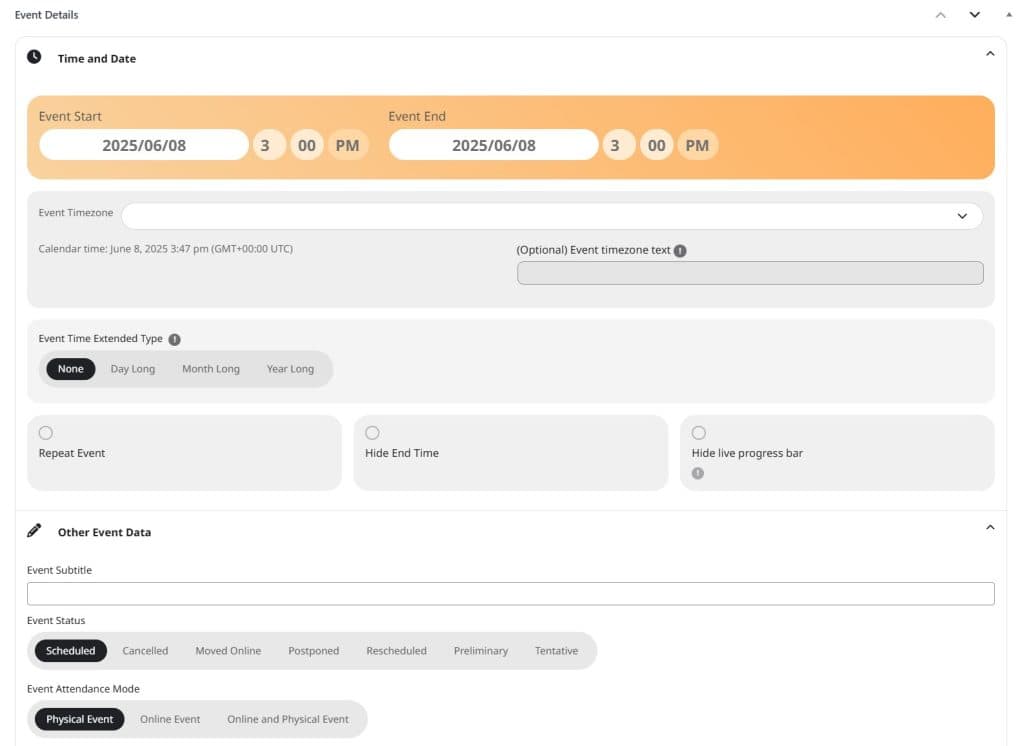
You can also add images, maps, health guidelines, organizers, prices, and social sharing options to enhance your event listings.
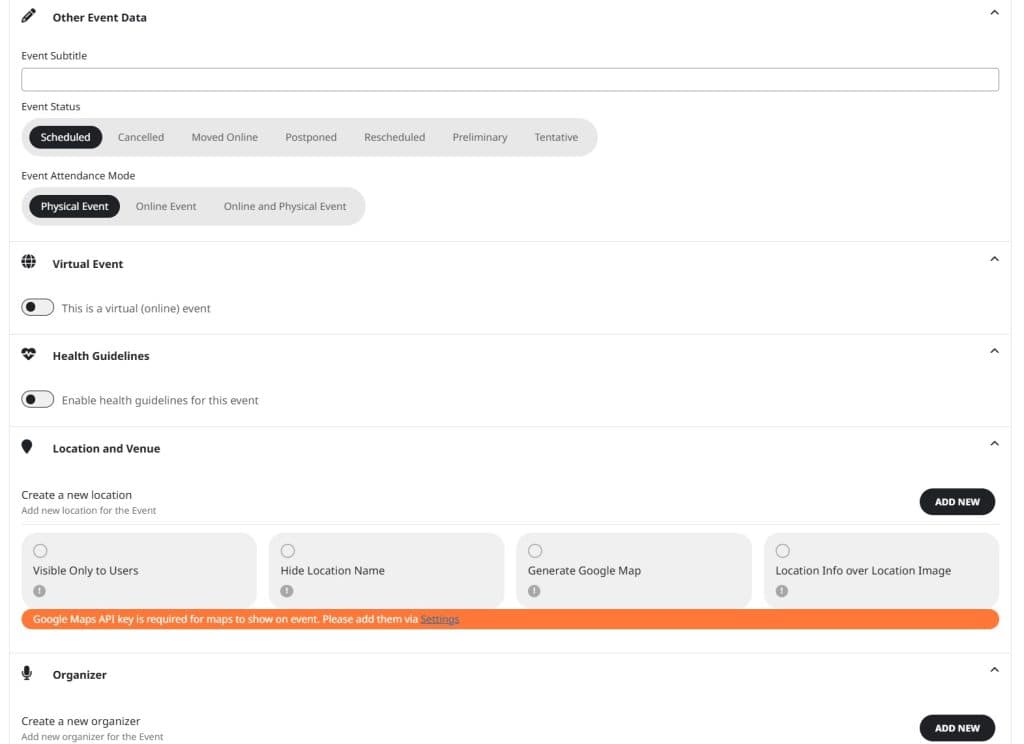
EventON is highly customizable. You can adjust the calendar’s colors and fonts to match your site’s WordPress theme.
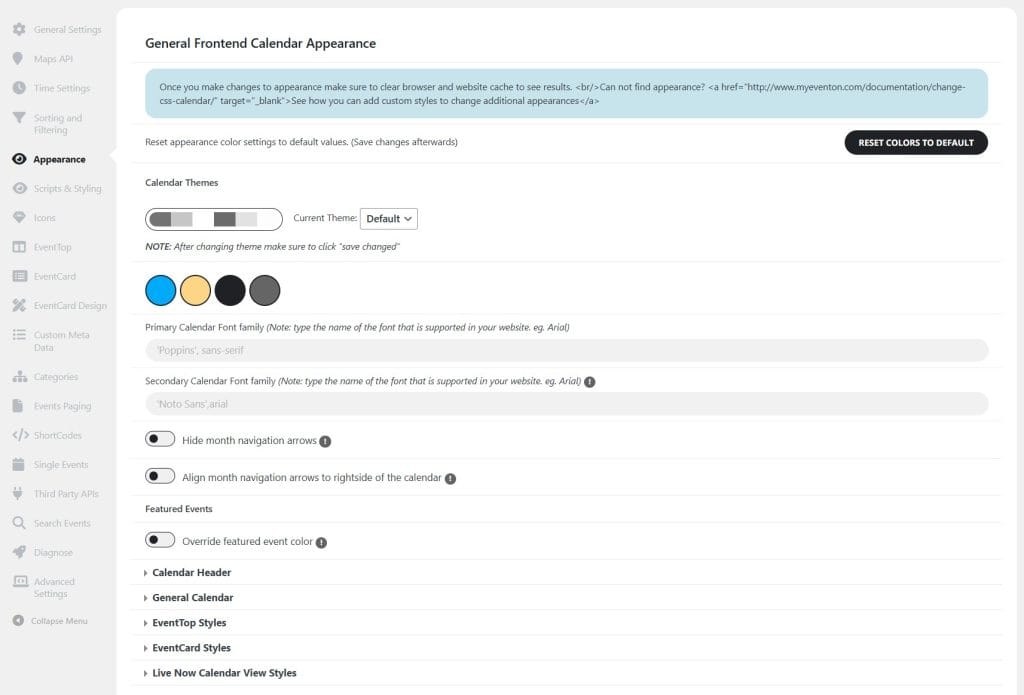
You can even edit or build new layouts for the event cards. You have total control!
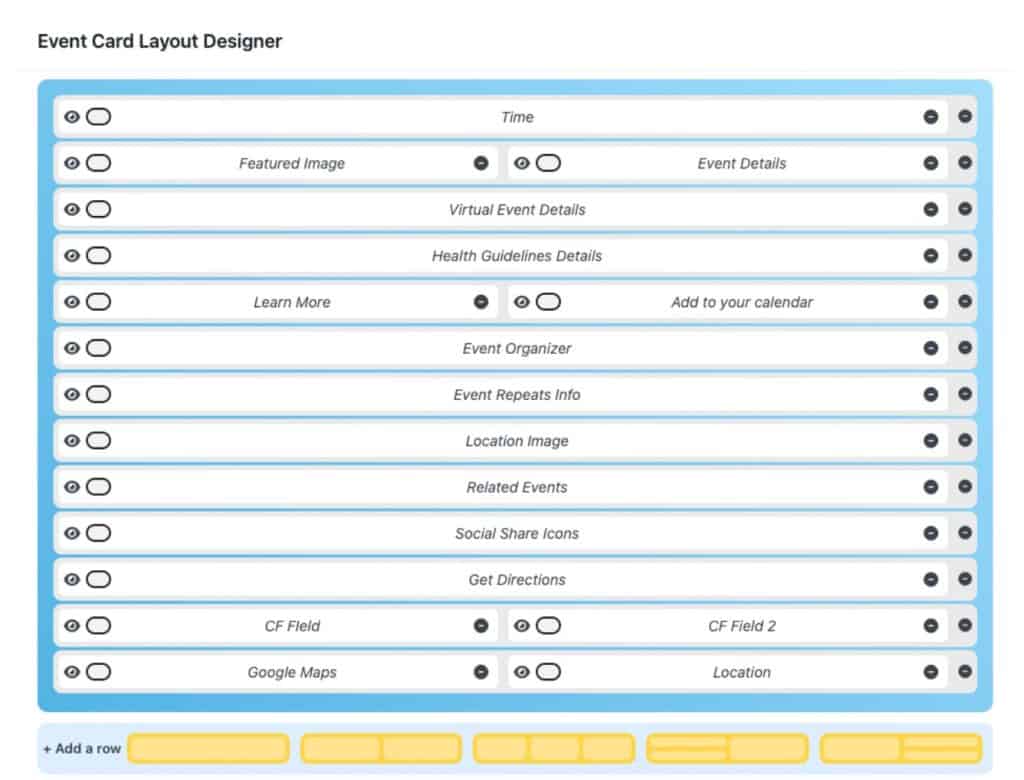
The plugin includes a shortcode generator and Gutenberg block support so it’s easy to place calendars anywhere on your site. It also offers features like event filtering, search, and sorting to help visitors find events quickly.
Main Features
- Unlimited events with custom colors and categories
- Support for single-day, multi-day, and recurring events
- Event details including time, location, and organizers
- Integration with Google Maps
- Social sharing options
- Customizable calendar appearance
- Shortcode generator and Gutenberg block support
- Event filtering, search, and sorting
What we like: EventON stands out for its modern design and flexibility. It’s easy to set up and offers a range of customization options. The plugin’s ability to handle different event types and its integration with tools like Google Maps make it a versatile choice for many users.
What could be better: While EventON offers many features, some advanced features like ticketing and RSVPs require additional paid add-ons. This means that to access the full range of features, you may need to invest in multiple extensions.
Pricing: The core EventON plugin is available for a one-time fee of $25. Additional add-ons, such as those for ticketing and RSVPs, are sold separately and vary in price.
The Best WordPress Calendar Plugins Compared
Feature | The Events Calendar | Timely All-in-One | My Calendar | WP Event Manager | Simple Calendar | Booking Calendar | Sugar Calendar | EventON |
|---|---|---|---|---|---|---|---|---|
Calendar Views | Month, List, Day | Month, Week, Agenda | Month, Week, List | List (Calendar via add-on) | Month, List | Booking Grid | Month, List | Month, List, Tile |
Recurring Events | (Pro) | (Pro) | (Add-on) | (Pro) | (Pro) | |||
Frontend Submissions | (Pro) | (Pro) | (Pro) | |||||
Booking / RSVPs | (Add-on) | (Pro) | (Pro) | (Add-on) | (Add-on) | (Add-on) | ||
Google Calendar Sync | (Export only) | (Add-on) | (Pro) | (Add-on) | (Add-on) | |||
Customization Options | Moderate | High | High | Moderate | Low | Moderate | Low | High |
Free Version |
What to Look For in WordPress Calendar Plugins
Before you install any of those WordPress calendar plugins, it’s smart to understand your needs. Not all plugins do the same things. Some are made for events. Some just help you stay organized. Some are better for teams. Others are great for showing your schedule to your visitors.
Here are the main things to check before picking one:
- Easy to Use – If you need a guide just to add an event, the plugin is too hard. Look for one with a clean layout. It should be simple to add, edit, or remove things from the calendar. Drag-and-drop is a big plus.
- Mobile Friendly – Your visitors are probably on their phones. A good calendar should look great and work well on both phones and computers.
- Event Management – If you plan to show events, pick a plugin that makes it easy to list them. It should let you add the time, place, and a short description. Some also let you add a location map.
- Booking and RSVPs – Need people to sign up for events? Look for a plugin with built-in RSVP or booking forms. Some can even collect payments if you sell tickets.
- Sync with Other Calendars – If you already use Google Calendar or Outlook, it helps to use a plugin that can sync with those. That way you don’t have to update everything in two places.
- Customization Options – You should be able to change colors, layout, and labels. It should look like part of your site, not like something extra slapped on.
- Speed and Performance – A slow calendar plugin can hurt your whole site. Choose one that’s lightweight and well-coded. Check reviews for any signs of bugs or slow load times.
- Support and Updates – Even if you don’t plan to contact support, it’s good to pick a plugin that is still getting updates. That means it’s more likely to work with the latest version of WordPress.
Start with what matters most to you. Do you just need a simple calendar? Or are you running events every week? Your answer will help you choose the right plugin.
Wrap Up
There’s no perfect calendar plugin for everyone. It depends on what you need. Want to keep it simple? Try Sugar Calendar or Google Calendar Events. Want full event control? Go for The Events Calendar or WP Event Manager. Need bookings? Booking Calendar is a solid choice. (If you just need a way for people to contact you, check out our list of the best WordPress forms plugins.)
Pick the one that fits your site best. If you’re using any of these WordPress calendar plugins, let us know how it’s going in the comments!


Leave a Reply